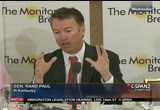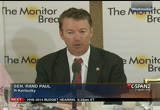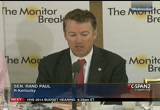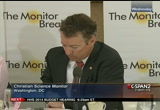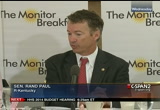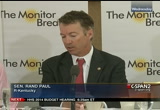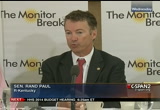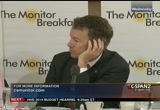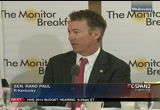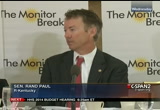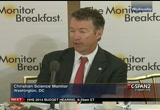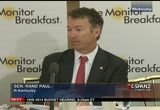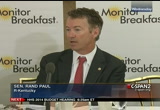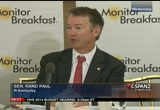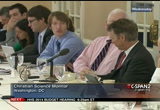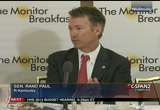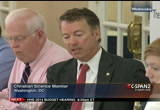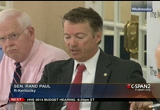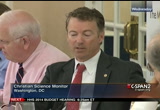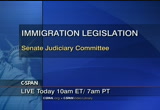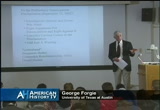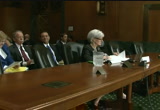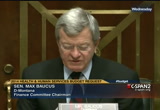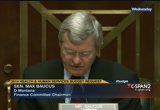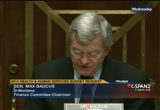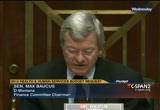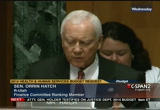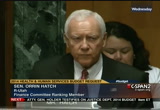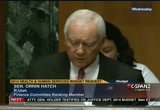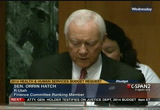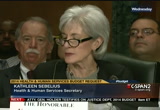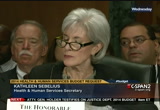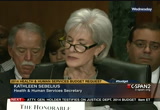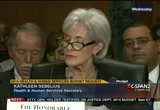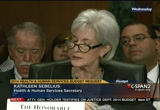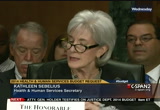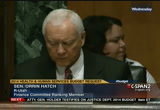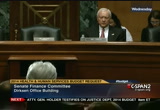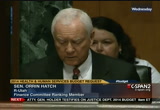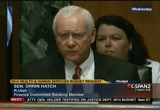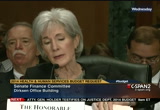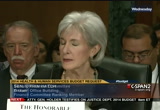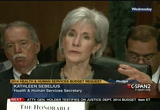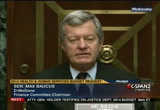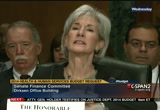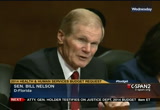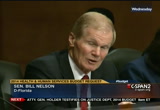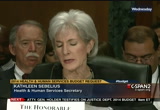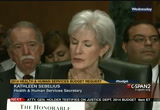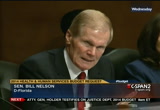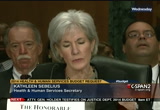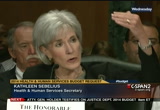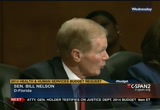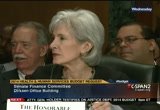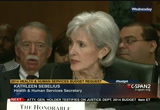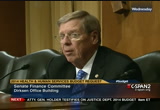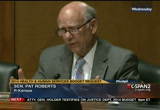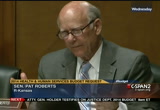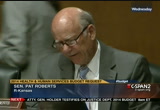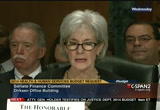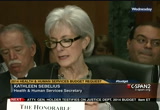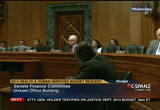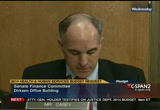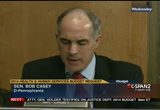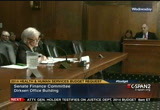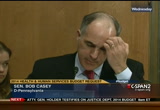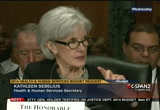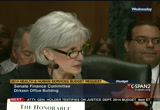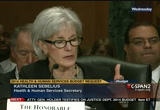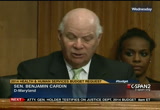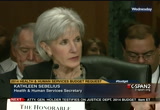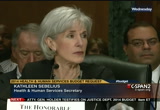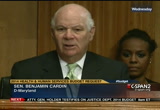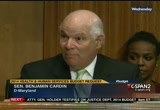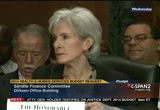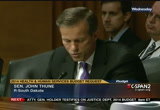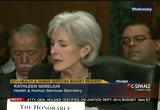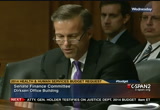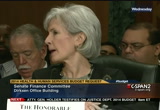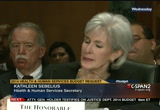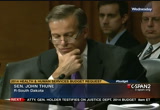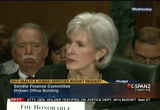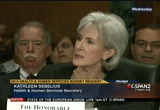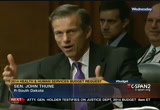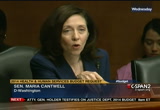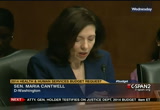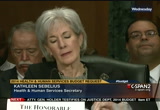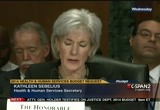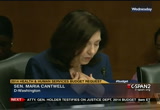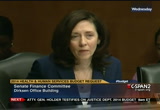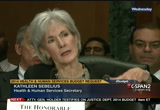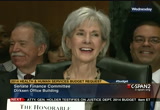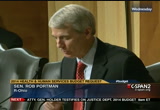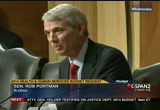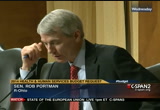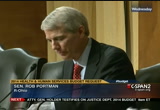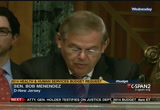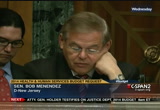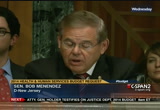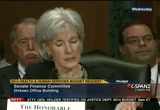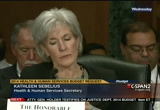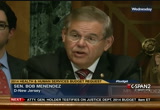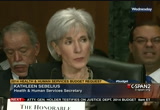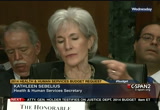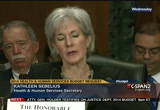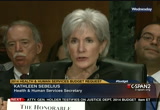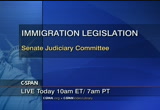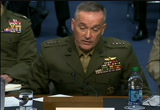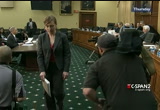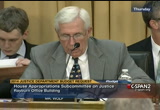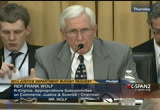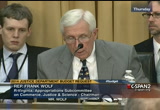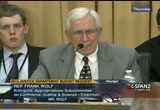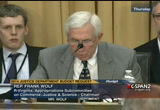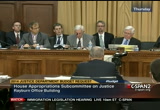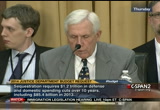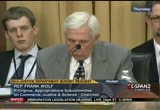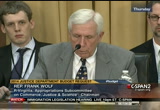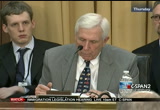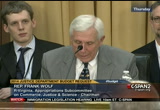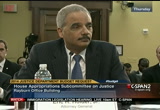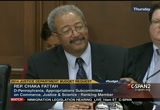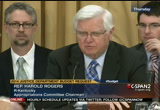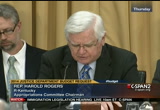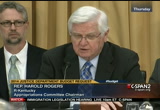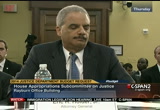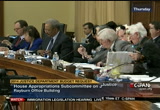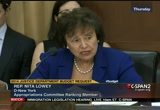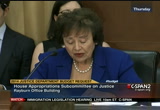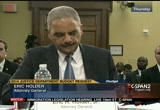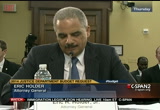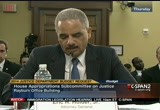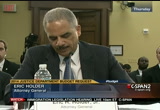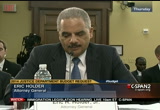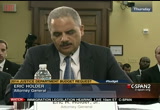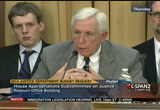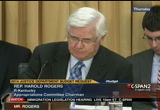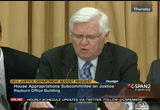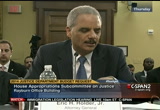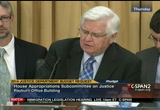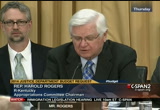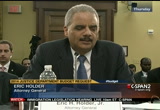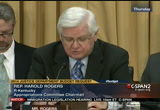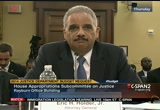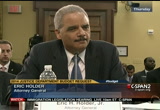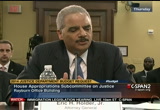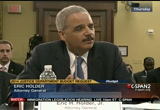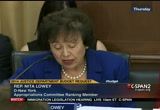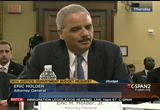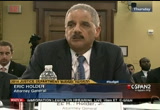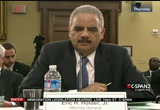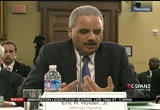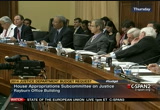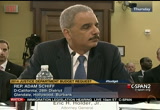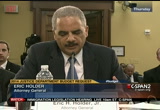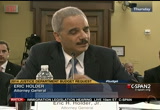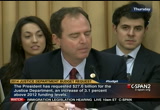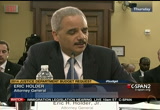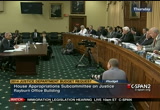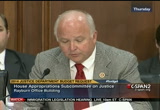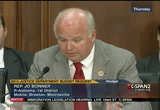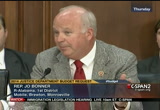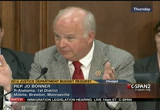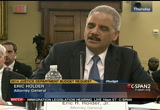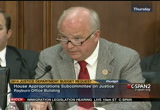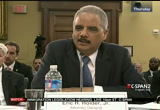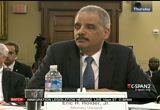tv Today in Washington CSPAN April 19, 2013 6:00am-9:01am EDT
6:59 am
7:00 am
i think the story is good, but there is a lot more we could do. returning almost $8 for every dollar we spent last you i think is very good news, but clearly this is a huge program. thousands of providers, millions of dollars go out the door every day, and we take fraud and abuse in incredibly seriously, and want to use more resources to really beef up the efforts that have proven successful. >> mr. chairman, in closing i would just say that all the new doctors we're going to need to implement the health care bill, we can't keep cutting graduate medical education, which is medicare subsidy for residents, and that's happened in m ste. it's happened to your state. it's happened in nevanthat e pridendg. u
7:01 am
>> roberts. >> mr. chairman, mr. chairman, down this way. could i be so rude as to intersect one second? last week i commented senator roberts to let them take one question at this time, out of my country to go to a meeting. i have to leave but i have one relevant point with regard to chairman boxes question on the navigators. so is mr. roberts would you for just one second? >> i would be more than happy to yield to my distinguished colleague. >> madam secretary, senator baucus asked you the question about the navigators. i understand you're about to award $54 million in contracts to hire navigators in the states with exchanges, is that correct? >> that's correct. >> yet, it is putting most
7:02 am
brokers out of business because of the 85% threshold for medical loss ratio. so we are spending 54 million tire navigators yet because of the rule on the medical loss ratio we are cutting out most of the people who provide these services in the private sector which caused the government nothing. i've got legislation with ecause i tnk wesome others to need to revisit that medical loss ratio rule wht effect it actually has on people getting credible information from people makea living. >> senator, i would be happy to take a look at the legislation. there is no prohibition first of all for agents and brokers to be navigators. secondly, exchanges at both, at the state level can dei agtskersas part of the funding stream to do the outreach. but we certainly have not a
7:03 am
laminated their ability -- eliminated their ability to do the job and to bring people into insurance companies as they have for a long time. the medical loss ratio is, you mentioned, deals with what is characterized as medical costs versus what is characterized as overhead cost. and you are correct, that rule does not include an agent and broker selling or commission as part of what is characterized as a medical cost? >> at one point, i appreciate you looking at because what it basically does is preclude those people from they compensate by the way the ratio of lies, and that's the reason -- >> they could easily be in the 20% overhead. they just cannot be counted, basically 80/20 but they can't be counted and 80% that has go to medical cost. >> thank you. thank you, senator roberts.
7:04 am
i appreciate that. >> senator est time. >> i know the secretary will be taking a hard look at that dshe isoner to our state prior to becoming governor so she certainly has that background. madam secretary, we have 82 hospitals as i think you know that are designated critical access hospitals. in the budget on page 53 i noticed that we're going to take a whack, another lizzie borden at the critical access hospitals, medical reimbursement rate. and there is a mileage requirement went back to back, i can remember days ago when we had somebody at that point it was h.e.w., but indicating it was 100 miles but it was okay to not include goodland because they have four-wheel drive. i could never figure that out site hope we don't go back to that. i wish you would take a lok at the critical access situation to the chairman has a lot of
7:05 am
feeling about that in montana. so if you take a look at a i would appreciate it. and the page 56 of the budget, there's a line here in the cards to ipad. my opinions about ipa i cover wl appear at the would be at odds with that. but a think there will set the medicare reimbursement according to reform to hear i won't read the whole thing. it's a growth rate to meet the target and they'll save 1.4 billion. 4.1 billion in regards to ipab. they are not even set up yet. and i just don't understand if they haven't been set up and we didn't, we have no idea how the recommendations are going to be implemented. and yet we're going to expand and strengthen them. i wish you would take a look at that and see if you could get back to us. i apologize for having three questions to you, but because of
7:06 am
the time limit i wanted to cover these three. about 53 people, we think 53 people have died and over 700 have become ill because of the meningitis crisis. i'm talking obviously about pharmacy compounding. the yeti has put forth legislative proposal that has been detailed on the commissioner's blog, and she is state funding will be necessary to support the inspections of other oversight activities outlined in this framework which could include registration or fees. i'm working on legislation, so other members of the committee hopefully they would be of help here, both to guarantee the efficacy of the program and then access tocompounding esident's budget, i've looked and we ant get a cost
7:07 am
estimate. if you could provide that with regards to the legislative proposal put together by the commission of fda, i would greatly appreciate it. if you could comment on that or anything else that i have brought up, you have about two minutes. >> well, i'd be happy to, senator. first of all, i will try to get as specific cost estimate for the very important legislation i think that you and your colleagues are working on with the food and drug administration, which would give some additional authorities over the nontraditional compounding and make sure the traditional compounding can move forward. i don't think that the fda has a legislative proposal that is specific. they have been working around some principles with the help
7:08 am
committee. so that may be part of the confusion. they don't have a draft piece of legislation but i think they have been providing technical assistance to the help committee, i will see where we are on a dollar recommendation. with ipab, the president has recently sent to the leadership of the house and senate majority and minority requests for recommendations for potential candidates. the legislation contemplates the president making appointments but in consultation with the house and the senate. so those letters have been received b leadership that the president's budget does suggest that the independent payment advisory board would not kick in unless medicare spending exceeded inflation by more than .5, cpi plus .5. we don't anticipate according to
7:09 am
the latest cbo initiative that that would hit until about 2019 on the track that we are on. so we are in the process of consulting with leadership around potential members. but as you know those members would have to be confirmed by the senate so there will be multiple steps and opportunities for consultation before that board whatever occur. and, finally, i share your concern about the incredible imports of critical access, hospitals particularly and world communities and we will certainly take a look at the specifics in the budget and be back in touch. >> i appreciate that. thank you. madam secretary, thank you for ing here today and your grea public service. this is had o y're dong, ition to the otherdo responsibility now. and appreciate the time we spent
7:10 am
prior to the hearing. wanted to ask you about children, but as a preface to that, wanted to note in the budget a couple of highlights, some of which you already referred to, but the parts of the budget that focus specifically on children bear mentioning. the home visiting program as well as early head start and child care partnerships, both of which are set forth on page four. the childcare quality fund, child support and fatherhood initiatives, all of those are so important and i want to commend you and the department for that. i know that nih, the proposed increases is $471 million. that's commendable necessary, despite all of the
7:11 am
challenges we have if we are not investing there we are making a big mistake. but i wanted to focus on a couple, maybe two questions really, on children. first on regard to the children's hospital, hospital graduate medical education program. i'm told that we have three great examples in pennsylvania, to i phe lin pittsburgh, chdren in bo cities convci christopher's in philly. and told that these hospitals comprise less than 1% of all hospitals, yet train nearly half, the number i guess is 49%, of all pediatricians. this is a budget allocation which has been in the six-figure, millions, in the proposal, and the budget is $88 million in funding for that program. i think that's a mistake. i don't agree with it, and i
7:12 am
think if we are not, i do know how we're going to get the trained pediatricians that we need. and i think the affordable care act contemplates if we don't have that investment in the future, give us the rationale for that 88 million. >> senator, first of all, i don't disagree at all that the children's hospitals provide not only incredibly important service and health care for children, but also training opportunities for pediatricians, they are sort of doing double duty. with the president's budget reflex is graduate medical education direct cost. what is eliminated from the budget recommendation is the overhead and administrative costs. we feel that this is sufficient to provide the number of residents slot children's
7:13 am
hospital operate think of anymore significant margin than other hospitals do, and it i not a choice we would've made an better budget times, but providing the direct cost for the number of residency slots that are currently in hospitals is one way to make sure that we trained pediatricians for the future. >> i hope we can spend some time on this, because when you have that small a percent of hospitals providing that level of training, i think we should go back to work on that. we can get back to you and spend some time on the. i also wanted to ask raised a question or two summer to a t relas to how children will fare in the new world of the exchanges, and how you see
7:14 am
the department's role in monitoring the impact on children with regard to the exchanges and making sure that if a child would under a different set of circumstances get a particular level of care, that they will still be able to get that same kind of care and treatment under the exchanges. >> well, i think it's a great question, senator. the chip program which does offer, i would say enhanced benefits for children, as you know continues to exist. one of the benefits for children that is sort of an indirect benefit, but i think andy very real is that there's a lot of evidence that indicates if parents have insurance, children are more likely to go to the doctor on a regular basis. if the family has a cell phone,
7:15 am
in spite of fact the child may have access to services, if the family really doesn't have family coverage, then the likelihood of actually accessing the services is significantly diminished. so i would say there's some value added benefits around family coverage that don't exist right now that will be a case in the future. and while the exchange program will not have a specific, you know, mandated package of benefits for children, what i think is exist in the commercial market right now, particularly in the employer market which is the model as the benchmark plan, is a pretty robust set of services in support of a children's health. it is there because of employee demand. so we will watch that very closely, and we will delighted to continue to work you and your office. i know that looking out for
7:16 am
america's children is certainly one of the areas that you have taken a great leadership role on, and we would be happy to work with you as these plans are being emulated. >> and i would hope, i appreciate that, i hope that some of the benefits from medical homes play out for families, that will have a positive impact on kids, especially children with chronic and complex medical conditions. >> certainly the medical home model i think, and coordinated care models both offer some enhanced benefits for children who have come as you say, chronic or multiple conditions. right now, too often that care is segmented into a variety of specialists don't talk to one another, who may not could knit with the family. so i think testingsoe models around chronic conditions while people often think of that as an older american issue, i
7:17 am
think there are cases where certainly it will be of enormous benefit to some of our youngest patients. >> thanks very much. >> senator cardin. >> thank you, mr. chairman. mads data, thank you for your extraordinary service during this very difficult time. and i want to bring up a couple subjects in regards to the implementation of the affordable care act and how the budget submitted by the president would e thosgoals. certainly -- shortly after the passage of the iq and i had a chance to talk about a commitment we made to minority health and health despairs. the elevation of the institute at nih and the offices and all the relevant agencies including hhs. you made a commitment to adequate funds of the initiatives, and i thank you for following up on those commitments. there is some concern today as to whether there is adequate budget support. to implement the type of grant
7:18 am
making in the offices, including your office door minority health, and whether the institute at nih has adequate resources in order to make the type of progress that we would like to see made as a matter of what is right policies for this country as was smart policy to reduce health care costs. can you just give you an update as to how your strategy is being implemented to fund this commitment? >> yes, senator. i think that there is no question that we have taken very seriously the charge to not only track health disparities but reduce health disparities. and the passage of the affordable care actd plementatie icare ahink will ad obably fasn any other single thing that we coul posbly doo t c the
7:19 am
gap in health coverage. having said that, while the budget i think in some of the offices within the secretary's office may have a reduction of some grants from the overall budget has a significant increase in funding for minority health issues, and one that we take very sisley, i think there are a couple additional couple hundred million dollars that are both in hrsa and some funding within the nih, unfortunately nih funding does not increase as significant as we would like and they also lost one and a half billion dollars through this request to cut. so we are in a more restrained situation i think than we would be otherwise with not only a tight budget moving forward but also a fairly significant cut in
7:20 am
the grant-making authority that hit in 2013. >> thank you. i understand the challenge of quesn ani wouldus urge us to be a strategic as we can toe sure that moves forward. i'm going to make ar ofrsonal t a look at a regulation that has been issued as relates to pediatric dental care. ms. tavenner was before this committee. i question her and then separate questions for the record. as you are probably aware, you are in the process of implementing a regulation that would allow for standalone pediatric dental policies to have separate deductibles. and with no assurance that, in fact, individual have that coverage. i believe both of those actions by hhs are contrary clearly to
7:21 am
the intent of congress, but i think also contrary to the legal ability, issues such regulation. we intended that pediatric dental the unessential benefit. central benefit means people have of rubble coverage. $700 per dockable per child is not a quality plan but it is second class coverage. most families will not reach $700 a year in pediatric and okay. why would they didn't buy injured, particularly if it is not going to be required? that to me is contrary to what congress intent on i believe contrary to law. so i would just ask if you would personally review this ofhis regulation and make an independent judgment as secretary as to whetr you to tkelas pediatricright cyth dental.
7:22 am
>> center, -- senator, i will commit to do that. i know that concerns have been raised about what is a proposed regulation, the comment. is still much -- very much still open so this is not a subtle form of going forward, but i hear your concerns. we have heard them from a number of people and i will commit to taking a personal look at exactly what the impacts will be on the very families who want to serve. >> thank you. i appreciate that. >> senator thune. >> thank you, mr. chairman, and madam secretary, welcome back to committee. thank you for being here. i have worked with several of my colleagues on this committee on a white paper which we issued yesterday, and it outlines concerns that we have about the electronic health record program which was created by the stevens bill and one of the chief concerns is the program wasn't thoughtfully planned and that cms and the office of national corridor for health i.t. are insufficiently focused on the
7:23 am
issue of interoperability. and i'm also concerned that the office of the national coordinator has a philosophy that is focused on simply pushing fedel dlars out the door and using sort of the dollars out the door as a measure of success of he program without sufficient oversight of those payments. i'm wondering if you agree with that? >> i do not. >> well, it's noted in our report that providers simply self-report, that they've met the necessary criteria to receive federal incentive payments for adoption of health i.t. with no documentary evidence necessary. your agency's office of inspector general has warned that this is potential problem. inspector general issued a report last using that medicare and i quote does not verify the accuracy and quote of the self-reported information by health providers claiming the incentives prior to the payment, and even noted a few examples of providers who had reported in
7:24 am
cells eligible but have not actually met the requirement. and so my next question is do you agree that self reporting is a problem in terms of them find themselves eligible? >> well, we take the adoption of electronic health record very seriously. i can imagine any other industry which represents close to 70% of our gdp which is trading information on paper files. so this is a significant move forward. we have about a third of the individual providers with another d in queuean almost two-thirds of the hospitals who are now in the process of adoption. i think that what has to be attested to, my understanding is will be firmly able to be tested more thoroughly when the interoperability standards go live in 2014. as you know, in meaningful use of stage two that is not yet
7:25 am
happened many. there is a lot of concern. it is sort of the gold standard of electronic health records. if they can talk to each other it's really not a venture that takes us very far. we understand that. but it is not live and running and it has been the focus of both committees from day one. >> well, and i in response to questions from this committee, ms. tavenner, the nominee ted cms, stated in written comments that they will not be implementation of -- delayed implantation of stage two. i asked given the question the lead to interoperability is not possible from the already existing requirements for stage two to stage three, what are your plans for stage three that ensures taxpayer dollars are beingisely used to invest in interoperability? >> again, we haven't gotten to implementation of stage two yet so you may be come you're reading the final chapter before we launch it.
7:26 am
januar 20 is when the portion of stage two that deals with meaningful use will be up and running. and i think we have fl plans and the timetable to then moved to stage three, but we don't right now have a plan about what could or could not happen. because we need to fully implement stage two. >> but aren't the rules final for stage two? >> are the final? yes. yes. >> well, if in turn -- >> but it's not up and running get. the timetable hasn't been reached. >> the thing i guess i would say, i'm concerned about, and this is the read from the current stage two requirements, particularly with regard to interoperability, it's going to be very difficult in terms of the challenge that's going to be faced by a lot of rural providers. and so my next question is, what are you doing to assure that small rural providers needs are
7:27 am
being considered in terms of stage two? and then ultimately stage three? >> senator, part of the framework of this implementation was really to create information and technology exchanges in every part of the country. and they are focusing most specifically on critical access, hospitals and on small providers. knowing that the l to have a big i.t. department or have people who could implement this in a sfiio of time were not there. so in every state there are individuals who are sort of, i compared them to the farm extension services, folks were on the ground literally, office to office, hospital to hospital, spend time on how to convert what the best strategies are,
7:28 am
how did engaged and involved. and we found at least in a state like kansas, which is not terribly different from the challenges i think that you see in your state, that that strategy has been enormously effective. and small providers are engaged and enrolled with those extensions operations, and find them to be kind of their service team on the ground. >> the only thing i would say, i hope that as we move forward with this, that the focus really will be on issue of interoperability we've asked questions numerous time of the committee hear of folks have testified in front of the committee about what's happening with regard to interoperability it may be that a lot of providers are creating their own health electronic records, but the idea that somehow they'll be le with others seems to be nonexistent in many cases. so you've got these silos out
7:29 am
there but until they can talk to each other we haven't solved this problem. and it seems like the focus of this, and that's what i say, a lot of them and has gone out the door come that seems to be the metric instead of what are we going to really, what's the metric or what's a measuring stick for whether or not we are succeeding in the issue of interoperability? >> i would say it again, senator, from the outset and absurdly agree with you that that has to be the sort of north star of whether electronic records were. it's not whether paper files or anybody's computer, but whether or not you can measure, share information across, not only across the states but across the country and conceivably across the globe. so that has been part of the framework of the formula to look at what sort of i.t. systems would qualify. what the specs have to be.
7:30 am
it's part of what has to be attested to that a conversion to an electronic record system has to have the capacity to actually get to stage three along the way, and demonstrate that figure doesn't have to be part of the operating system from day one, but it has to the capacity to add that on. there arve spefic ki o specs as part of wha qualifies for the incentive payments. think that is in part of what the technical committeeat as been the adviser to the office of national coordinator from the beginning has been focused on. how, at the end of the day, you make sure that the systems actually work. we were strongly advise, senator, and again at the dismay of i would say some of the biggest i.t. companies, but we were strongly advise not to choose one system, not to have
7:31 am
one win in this market and everybody else a loser. but rather to focus on a series of specs that would come at the end of the day, make sure that the systems were interoperable but then allow providers and hospitals and others to either make conversions of the system that they have, or purchase any variety of new equipment and that's really been the framework to have a more open source, but certain within interoperability at the end of the day. >> i don't know if, i'm glad to hear that you are focused on these specs. i do note that these specs existed and again the self attestation model that is being used seems to lack the kind of documented evidence that the folks were getting, or eligible for some of the assistance that his ct these right metrics that you were talking about. so i guess if you're thing i would say in conclusion is that
7:32 am
we look forward to engaging with you and your department on this and we're going to continue to solicit feedback from stakeholders about where they are and then i think this report that we put out will maybe put a fine point, dditional focus on that. so thank you. >> thank you, senator thune. madam secretary, welcome to thank you for your help on basic health plan. appreciate that very much. also thank you for the president's budget as it relates to 1 billion for mental health programs, for substance abuse, mental health services, and 460 million for the mental health block grant services. i think that will go a long way to helping states deal with these issues. so very much appreciate that. wanted to follow up on my colleague from pennsylvania's question, particularly as related to graduate medical education. this is a big issue for all of us in the country obviously with the shortage that we are looking
7:33 am
at, something like 90,000 specialists and primary care physicians by 2020. for us in the whammy region, washington, alaska, montana and idaho, we are even below the national average now. so that's why we care so much about this issue. wh it comes to fgngout impact o, he mentioned children's hospital which i about seattle's children's hospital but the issue is also, centers or burn centers like harborview hospital. so when you look at this reduction in indirect medical education, it impacts that workforce. they have residents of their that they are not reimbursed for under the medicare model. so how do we, how do we look at this issue when there's specialized training that goes
7:34 am
on at these trauma center's? they want to get the graduate medical, how do we look at this and make sure that these facilities can keep running and operating during this time period? >> well again, senator, i think certainly the training of new doctors is of critical importance, and we know what an important role graduate medical education funding through medicare plays in that training. which is why i would say even in peace very difficult budget times there was an attempt to make sure that we are funding the direct costs, as well as doingaonal lookat in rva lot of the worce analysis lkiforward indicates that it is in primary care providers,
7:35 am
gerontologist, others that we often have significant gap. so we have not only tried to have a budget that supports the direct cost of graduate training, but also shift some of the unused gme slots from areas that may have been more focus on specialty care into primary care pediatric care, gerund apology care, hoping that the effort to address people's preventive care needs at the front end will be met with health care providers. so we would be interested in working with you and hearing from you about the impact of this on critical center like a burn center and the trauma center's that you have in your area. >> thank you. we will get you some information on the. i don't know that's intended consequence but i think people
7:36 am
are concerned that will be the intended consequence because those costs are not covered so maybe there's something we can do there. and if you could comment, you know, university of washington, we train to cry many -- so many primary hysician we're also very high on the list, and the top five of institutions of nih funded. so thi budget s is a very big issue and we understand what you have done, oously eric these institutions are looking for, hoping to get closer to 32 billion than 31.5, and you think that's close, what's the difference? why does that matter? for us the total economic impact for research, you know, 800, 8800 jobs and 470 million in wages. so this will be a big impact to ask. in fact, one of our professors was quoted in "the wall street journal" as saying quote people are asking me whether i should leave science and quote.
7:37 am
so give was already in the budget, and what's being discussed as far as sequestration? are we having a chilling effect on this investment in science, and what can we do to help mitigate the sequestration's impact on nih funding? >> well, i think the president has proposed a budget going forward, and a way to have sustained and balanced approach to both reducing the deficit but making some of the critical investments that we need to make, and actually the budget anticipates -- >> we are all -- i should add, start in row. we are all cheers about the magnificent contribution to brain research. thank you. >> i think that's an example of the presidency believe that we ur proper t sinst, and certainly scientifc sech is one of the most critical investments to keep the
7:38 am
innovation and research at the front and. so we very much support outlining the mapping strategy which could have a huge impact not only on the future but we think about health costs related to everything from autism to alzheimer's, and if you want to really get our arms around what's happened to health costs in the future, just brain mapping, has an enormous impact. and as you say, i think dr. collins estimates that is about a 71 return, that every dollar in research grant generates about $7 in economic activity in the community where those research grants end up in terms of jobs and scientists. so this is clearly a win-win investment, as the president very strongly believes in and supports. >> i hope as we continue to talk with and see the impacts of
7:39 am
sequestration the administration will speak out on this because it's a very shortsighted approach, particularly comes to the nih budget and hope that we can get organization and institutions, whether it's the institute of medicine o others to put pencil to paper and really measure this as you just didwith that seven to one ratio. but we may be saving a few dollars now but it will cost us millions if not billions more if we don't continue the investment in research. so i hope we can make that point to our colleagues. thank you. i think senator portman, you are next. >> i think you, senator cantwell. i think i am last and only as well as next. [laughter] >> you never know who may come back. >> exactly. you just had an interesting exchange about the need for us to do more research and i would make the obvious point that that part of our budget is being squeezed more and more and more by the reality that the mandatory spending part of the
7:40 am
budget and staff 65% of the budget, which is the part that is on autopilot that is not appropriate every year, is the fastest growing and the biggest part of the budget. and one reason the research dollars are tough to find and one reason children's hospitals are concerned is they see the squeeze, including our children's hospital in cincinnati. on the mandatory side of the budget, of course and it won't cost driver is health care by far. the congressional budget office which is a nonpartisan group in congress has given us another report. this one is looking forward to the next 10 years, what's going to happen in terms of our budget. they said it will be 110% increase over the next decade from 800 billion to about 1.65 billion to 110% increase in health spending on the mandatory side. they also make the point that if we don't address this problem obviously continues to grow and then over the next three decades they say the health spending in
7:41 am
essence bankrupts the country because you can't raise income taxes at least high enough to cash that level of spending but it can't be done. indisputable that that is our number one problem in terms of the budget. we hear talk about the budget today. i just wanted to get your thoughts on that. the white house has proposal in the budget that as i read would reduce that growth from about 110% over the next 10 years to about 100%, but it's 104% because it also assumes a permanent medicare doc fix and also does include a 90 billion a canceled sequestration cuts to medicare which would further decrease health savings. so it's somewhere more than 104% increase in spending rather than 110%. no structural reforms. the question is what the trustees having told us medicare trust fund is insolvent in 2024, again with everyone who's looked at this thing our number one driver in all this is medicare.
7:42 am
and once again th mire funding trigger ha'teen ignored so no proposal from the administration even though it's required by law. my question is, what do you suggest in terms of dealing with this problem, which everyone now acknowledges how are we going to close these unfunded liabiliti liabilities? what is the administration's plan to bring long-term solvency to our medicare program? >> senator, i think there's no question the president is eager to work with congress to have a long-term strategy that both ensures that we keep the commitments that we make to seniors and others in the mid '60s, around benefits in their senior years, as well as looking at the viability of funding and support for medicare and medicaid into the future. i think in the last three years
7:43 am
there is an enormously positive story to tell, and very different story than we have seen really over the history of the medicare program. last year alone, the per beneficiary cost rose at the smallest level than it's ever done in history. it's at point four-tenths of 1%h right now deals with demographics, not health costs. and i think that effort is very much under way to really rethink and we look at how we pay for health care, shifting from a volume payment to a value payment, testing models for the first time ever that could lead to significantly better care at lower costs. and those efforts are very much underway. medicaid spending is down 2% from 2011 to 2012.
7:44 am
again, a decrease year over year spending, and again, that has not been seen. so i think structurally the cbo has revised its estimates recently based on the cost trend. we know that the president's budget on the table, the affordable care act added about eight years to the life of the trust fund. the budget on the table adds another four years but if this cost trend continues i am optimistic we can revise that even for the. and we be eager to look at a longer-term strategy around how we make sure that the commitments to seniors and those disabled americans are fulfilled and not shifted the cost onto fuing chthe lteg medicare is talking about destroying medicare as we know it. >>ith all e rone people are looking at sensible ways to reform the program so it
7:45 am
is strong and it can be there for future generations. the cbo is the one about a few weeks ago so it does include that data. and your own dataindicates the same thing which is these costs are unsustainable by any measure. and i hope you'll look at some reforms that were structural and i know that, you know, you support in the budget some means testing is france's but i would ask you to look at medicare part d. merrie tavener the note h.r. nominee for cms can before the e committee, tell us that shall cause or party are 40% less than the original estimates. cbo has now reduced its projections over 100 billion each of the last three years. your deputy administrator has said that party costs have remained flat for years, expected to decline in 2014. if also reported over the past three is the average monthly benefit print has been essentially flat, write about 30 bucks a month. so i believe this indicates there's something going on in part d which is frankly that
7:46 am
private sector has to compete for the business of tens of millions of seniors. and that is one reason that those costs have been less than projected. so i encourage ylearn fro it, not undermine part d. i noticed in your budget you target part d again. particularly the events program which is you know governor -- seniors enjoy it. so i would just ask you to take a look at that part d success rate and seek him in my view, i think that's are some of the structural reforms can, should be made. and i think you for your time today and for your service. >> thank you, senator. >> thank you. senator menendez. >> thank you, mr. chairman. madam secretary, thank you for coming. there's a lot to applaud in the budget. certainly the 100 million investment to advance research and outreach for alzheimer's
7:47 am
disease, something that took my mother's life. the funding for camp verde health centers, incredible important. the quality primary care in cambridge throughout the nation, those are all great things. and there are still tough decisions to make and saving, i think we did a lot of that in the affordable care act. and i've long held the real long-term savings can and should be found by encouraging the efficient delivery of health care. through measures such as increasing the use of electronic medical records. we are on our way there. promoting the efficient and well manad delivery of medication t.improving coordination between ute an pst-a providers toure thappropriate care setting. do you share those views as to how we save money and those errors? >> yes, senator. i think all those are enormously important shifts in what health care is delivered as opposed to just paying for volume looking at really valuable proposals.
7:48 am
>> and so with that having been said, i'm a little dismayed at some of the so-called savings that are identified in the medicare program. that in my mind are nothing more than around another cut, another set of cuts. and i look at that and i say to myself, following on on senator portman's questions as it relates to part d, isn't it true that the part d program currently costs about 40% less than the original estimate, and that the cbo has reduced cost projections by more than 100 million a year for each of the last three years? >> yes or -- yes, sir. that is active and i think o of the negotiating authority that you actually directed to cms as part of the affdabl careacta beneficial effect e of those part d
7:49 am
negotiated -- >> isn't further treatment under the affordable care act, that with a doughnut hole rebates under the cost containment provisions, the beneficiaries have not only saved about $6 billion in drug costs since the lowest time, but that their premiums have essentially been flat? >> yes, sir. >> given to the program is being, proving to be successful providing seniors access to the drugs they needed, caused by continue to be below estimates, could you ensure that the imposition of medicaid so rebates in the part d program won't ultimately lead to restricted formularies increase premiums and higher out of pocket costs for beneficiaries? >> well, senator, we are confident that the kind of drug strategies that provide available drugs for dual eligible are similar to what can
7:50 am
be in place for the same individuals as senator nelson said when they are 64 shouldn't changed when they're 65. so we are confident that this will not only be a savings to the government, but actally make sure that beneficiaries have access to the critical drugs they need. >> so you don't believe that such move will create restricted formularies? >> no, sir. >> you don't believe that it will create increased premium? >> i think that there's no question that there may be some formularies that are in place. but as you know, dual eligibles does not lose any of his or her medicare benefits. so they must have the same benefit package. >> how do we ensure that the research and development that makes is the leader of the world and that makes is globally competitive, and maybe even more
7:51 am
important than that, create life-saving, life enhancing drugs, doesn't get diminished? >> well, i share those concerns, senator, byfield at medicare part d in spite of the fact that it is -- despite when the benefit was first created it still paying at a much more substantial rate than the veterans administration, the medicaid program and the bright of other programs that we are still paying premium dollars for a number of those drugs. and for these 9 million individuals, the budget assumes that on balance this is an appropriate way to both save some dollars going forward but also make sure that those beneficiaries receive the critical medications that they need. >> i just don't think research and develop a dollars -- if i may, another minute? >> final. >> final. with reference to hospitals, one was raise with you, cms is
7:52 am
pinning something that was part of the affordable care act. it is a critical issue to new jersey hospitals, and we are awaiting a response. i just want to bring it up again, because it's probably life or death for a whole host of new jersey hospitals. and in line with hospitals, the medicare cuts to hospitals, the president's budget calls for about $11 billion to graduate medical education would have 77 million-dollar cuts for children's graduate medical education programs. both of these are critical to drink the next generation of doctors, and you know, one of the things we heard about as we were this committee debating the affordable care act, which i was proud to support, how do we have the health care workforce to deal with millions more who we've obviously aspire to cover. going to end looking at the agee
7:53 am
of many dogs, particularly and cen part o country, -- doctors. how does cutting back on the program specifically designed to train physicians go to provide come is going to provide for the workforce that we recognize we need? >> senator, i understand the concerns about the reduction in graduate medical education, the budget is based on a design that would provide the hospitals and children's hospitals the direct cost for those residency training programs. it does not provide the overhead and administrative costs. we feel that having the direct cost continue to be paid should not diminish the number of residents who can be trained in those programs, but again, it would not be a budget choice in a different budget time.
7:54 am
but it's a time of very scarce resource and what kind to make sure that we can fulfill all of our obligations. >> i appreciate. this is a concern. because at the end of the day after all the effort we created to provide coverage that was both affordable, make sure we try to control costs, and at the same time apple five the universe of what americans would be for the covered in the present or not. it creat e necessity for a copy of physicians encourage. and cutting this particular field, i understand the challenges and trade-offs, is just undermining the very essence of some of the goals that we have intended under the affordable care act. ho bth as we move forward in our deliberations. thank you, madam secretary,. >> madam secretary, i would like to just ask a bit more about the
7:55 am
concept of one-stop shopping one resource center, one place for businesses to go to so that i have to deal with so many agencies with respect to the invitation of the affordable care act. does that make any sense to? >> senator, there will be a one stop shop with the shop exchange up and running in january 14. so business owners will be able to into the marketplace through a one stop area, get the information about what is available, have a choice of plans. is the business owner qualifies for the employer tax credit based on the number of employees and the wages of those employers, that will automatically be part of the program. so there will be a one stop shop available to small business owners who, as you know right now, often pay 18-20% more in
7:56 am
the market than their large competitors. and we are verycfit that the left better choices, better prices with the new makece that will be up and running. >> just real concern he is from the business perspective more than consumers, individuals i think i heard you say the shop will be delayed. >> no, sir. that is not accurate. the shop will be up and running in every market in the country. for the states where the federal government will be operating the marketplace, we are delaying one portion of the s plan which is that employers, if they choose to do so, could offer a wide variety of plans to his or her employees. year one for the federal marketplace is, employers have a
7:57 am
choice of coverage for their employees, but that choice will then be passed along. year two and beyond for the federal marketplace is, the employer, if he or she chooses, can then turn to the employees and say, you can choose among, you know, 15 different plants. ever state-based marketplaces, that employ could be available from day one. but we will have a two-step -- so 2014 all employers will have a choice. they will have a choice of plans to offer their employees. they just will not be able to say to that employee should they choose to do so, you can choose any plan in the shop market. >> okay. well, as i said, we will be watching i,and let us know what help you need, too. it's a two-way street. >> i will be happy to do that. >> thank you. good luck. >> thank you. >> the hea i adjourned.
7:58 am
[inaudible cnrsations] >> several lives events to tell you about today. the senate judiciary committee holds hearings on immigration legislation being proposed by a bipartisan group of senators. witnesses will include homeland security secretary janet napolitano. that's on c-span at 10 a.m. eastern. here on c-span2 at 1 p.m. eastern postmaster general pat patrick donahue speaks. he urged lawmakers to allow the service to drop saturday deliveries to cut costs. also add one eastern on c-span3,
7:59 am
the council on foreign relations will hear from the german finance minister about the state of the european union and financial market regulation. >> i strongly urge you to come up with a number to tell this committee and the american people, we have a responsibility as well, for you to say, well, we are just going to see how things turn out that will determine the size of the 2014 force. i believe is a tragic and terrible mistake for which we may be a very heavy price. >> senator, can i comment on that? >> assured. >> center, to be clear i didn't say leave it completely died. we are today advising and assisting at the battalion level. we will lift off the brigade level here this fall. the number of post-2014 is inextricably linked to a level we believe we need to provide advice and as fast spend you have to wait until 2014 to
8:00 am
determine that? >> we do not. what i suggested was that this is the afghans first summer in the lead. i believe this summer will be the bellwether for afghan performance in the 2014 and beyond. ..0i0ipgpgpg >> live coverage both days with book panels and your questions for authors at the festival. and on c-span3, american history tv looks at revolutionary era printing. from the american antikaren
8:01 am
society in massachusetts. that's sunday at 7 p.m. eastern. >> now, a hearing on the justice department's 2014 budget request. attorney general eric holder testified before a house appropriations subcommittee for a little more than two hours. >> attorney general holder, welcome before the committee, and thank you for appearing. what i'm going to do is i'm going to hold my questions until oatch planes because there are and go out of town, but i'll have an opening statement that will cover a number of the questions and concerns that i have. t me address the bombing attack at the boston marathon on monday. we know that the fbi and a joint terrorist task force, the atf and its forensic special u.s.es are working nonspot -- specialists are woing nonstop
8:02 am
to assure that we have no other attacks. let me assure you that this committee, this subcommittee is ready to help in any way we can to help law enforcement catch the perpetrators and planners of this act of terror spin sure that -- and insure that the full force of justice is exerted. my wife is from the boston area, i actually ran in the marathon in the early '70s, so anything this committee can do, we stand ready. i have several points i want to expression of disappointment with regard to you and me and this subcommittee. i'm extremely disappointed in the direction your office has taken, or in some cases has not taken in important policy matters. i'm disappointed the department has been slow to use the mr. speaker bl authority the committee provided to start new pilot effort toss expand federal prison industries. the number of employed inmates has fallen from 23,000 in 2006
8:03 am
to 12,800 in fny-14. we have made it very clear that i want to support you in this effort, but we need to see that yoreaking it seri and going after it in an energetic way. the bureau of prisons has started procuring -- [inaudible] from the fbi. why can't the ncaa buy every hat from the bureau of prisons? there's only two hat manufacturers left in america. they could them up with them. why isn't every national park service hat purchased? you can't puppet a man or woman in prison -- puppet a man or woman in prison for 15 years and give no work or dignity. this would repatriate work from china and other countries and make some progress in reducing our prison population. i'm also dissatisfied and
8:04 am
disappointed with your noncommittal response to my suggestion that justice consider an assessment of path-breaking work be done on states in prison reform. we need to benefit from it. you never, ever followed up. we're interested in establishing a national commission to look at reform options and comprehensive and a thorough manner, and it seemme that'smethin the department should embrace, but m not ingold m ba or hold my breath. i must also express my disappointment in the way you have abused, and i cannot say it with strong enough words, the reprogramming process. the committee includes language in the bill each year to provide the department with the flexibility to reallocate funds
8:05 am
between programs to address emerging needs. the reprogramming process has developed to allow such flexibility while still preserving congressional priorityings and intelligent. last year you disregarded the committee's direction, the congress' direction and proceeded with an uns precedented 165 million dollar reprogramming to support the purchase of the thompson prison in illinois, something that was actively sought as an earmark by senator durbin. it wasn't in the president's budget, and it is an earmark. it is an earmark. and it basically violates if not the law, it violates the basic sense and process but was not included in the president's budget nor any appropriations act. in fact, congress has denied a similar program and subsequently resended the funds that have been identifie a potential source for the thompson purchase. fa being felt. first, you have undermined your
8:06 am
relationship with your funding committee. the reprogramming process is based on comity, respect, willingness to talk to one another between the branches, and shared respect and prerogatives of both branches. it says in the absence of comity and respect for the prerogatives of the committees and congress in general, the committee will have no choice but to include specific program limitations and details legislatively. programs, projects and activities become absolutes, and the executive bran be. shall lose the ability to propose changes in the appropriated funds, unquote. and this is what has come to pass. in the absence of trust and comity, the congress enacted an fy-13 bill that significantly reins in your ability to reprogram and transfer funds. because of your activity, it actually hurts, it hurts future
8:07 am
attorney generals that will follow you whenever that time may be. secondly, by furthering away the $165 million to satisfy an earmark request in the face of rong opposion from the committee, you seriously eroded bilityto addressus ye and next, problems whichscal have already necessitated extraordinary measures just to avoid furloughs. let's be clear, the fbi agents, the bureau of prison correctional officers and other employees could be furloughed, if not this year, next year for the lack of funds that were forced last year on thompson. to allow this to happen, in my opinion, is bad judgment and poor leadership. had the furloughs taken place, you could call them the holder furloughs or the holder risks, if you will. i understand even though you could be facing sequestration
8:08 am
and furloughs in fy-14, you're requesting yet more funding for thompson. perhaps a more fiscally, responsible approach would be to sell the prison to the highers bid wither and seek -- highest bidder and seek to use the support. i'm disappointed and frustrated at the snail's pace in action by the department in addressing other serious problems, some solvable human trafficking problems. you indicated to the committee last year you would reach out to the polaris project to find ways to collaborate on rooting out human trafficking. we have discussed taking action to shut down the adverting of backpage.com but, again, we've seen no, no movemt. we sent letter, we faxed in to you many letters, and we never get an answer. northern virginia we've had a number of cases where young women has been sexually trafficked. we can't get an answer from you with regard to backpage.com.
8:09 am
and the fact that you've been reluctant to even deal with that issue is very, very troubling. we're still waiting for a response to my letter calling for reform of the civil rights division, especially the voting section. a recent inspector genre view showed a longstanding pattern of dysfunctional harassment -- this is the ig. this isn't a member of congress up here, this is your own ig appointed by you. you must have had some impact. showed a longstanding pat everybody of dis-- pat turn of dysfunction, harassment and demands a strong response. the inspector general referred remaining personnel to the department for possible discipline. an administrative action, maybe no administrative action taken. andssed concern about continued policies that should cast doubt on impartiality of the voting section. i recommended independent, outside review. outside to make reform recommendations. surely this is something that we
8:10 am
n put into motion. yet i've seen no action op your behalf. and in the area of executive use of agency aircraft, i'm troubled by the gao report that 41% of the everyone to general travel for 2007 to 2011 was for personal reasons. while i know the attorney general is a required use official who must use official transportation, i have to wonder do you ever have second thoughts about any of the travel? if you think about a couple of the trips do you ever say, i don't know that that was the best use of the taxpayer money, particularly because we're going through the sequestration issue? there are orr areas we've been trying to work with the department on priority issues, and it's discouraging to feel we're not able to get traction on critical issues. the letters, the last three letters, n response. not even an acknowledgment from the department. you're testifying today on the fiscal year 2014 department of justice budget request excluding score keeping adjustments, you're requesting $28.1 billion
8:11 am
in new discretionary budget authority and an increase of $1.5 billion at 3.9% above fy-12 before sequestration. your fy-14 request reflects some significant issues with sizable offsets. the increase includes gun law enforcement and background checks and to grant programs for gun safety technology and funding for state criminal history improvements. this alsocles 150 million in new cops funding for a broad comprehensive school safety program in funding a variety of positions. the budget also includes $668 million for cybersecurity with about 92 million in increases for the fbi. you're seeking 55 million in new funding to investigate and prosecute financial mortgage fraud. to address prison overcrowding, you seek 291 million to activate
8:12 am
new prison facilities and expand detainee resources. we'll have questions regarding investigative and surveillance capabilities, human trafficking. the d.'s efforts to address cyber and gun violence, we're also expected to ask how the department's efforts to insure enforcing civil rights law meets the highest standards of professionalism and objectivity, but we would expect to hear more about how the department would address the challenge of sequestration. i'd like to take a minute to recognize atf special agent scott sam ponce. outstanding service to the committee. he was first staffed in january of 2008 under chairman multihand and has served the committee with great distinction for the past five years. scott is returning to atf headquarters next week, and we all wish him well and much success. scott, you are a credit to the atf and to the department, and we thank you very much for your
8:13 am
service. mr. fatah? >> thank you, mr. chairman. first and foremost, let me welcome you to committee. i know that there's many things that immediately are focusing your interest and concern including the incident in boston , and i know that the entire justice department -- the fbi, the atf, your offices and others -- are focused on this matter, and i know that time is limited. i would respond to each of the criticisms that have been offered by the chairman, and we are truly good friends and work well together. needless to say, it's not surprising that the majority party, different from the president's party, might take issue with some of the activities of a cabinet member. and it's been part of the pattern. you can't, obviously, represent the administration's point of view and represent the house point of view because they're
8:14 am
too drastically different points of vws on almost every subject. but in this particular matter, what we're focused on is your appropriations request. what are the dollars that you need to run the agency that's responsible for protecting american citizens. and for years now you have done an extraordinary job, and the d. of justice and all of the men and women under your control have done a great job in this respect of dealing with a whole range of issues. and so we're going to get into the accounts and what you need. needless to say, you know, we could respond to each ask and every point. i do, however, agree with the chairman that we need to, that the thompson prison issue did, i think, step on the normal processes of the appropriations process, and as an appropriator, obviously, i would be concerned about that. but i welcome you. i know that your time is important today as it is on every day, and the chairman was
8:15 am
wondering whether you would question some of your trips. i'm sure you probably question any trip you have to make up to the hill. so, but we appreciate the fact that you're here, and i yield back. >> thank you. i'm going to go to mr. rogers and ms. lowy, and then we'll turn to you, general. mr. rogers, chairman of the full chief. >> mr. chairman, thank you forye general, thank you for being here. welcome. we all are wishing you well in the investigations and the prosecutions of those who perpetrated this cowardly act in boston. so we wish you well in that regard. your fiscal '14 request, $28.1 billion, that's almost a 4% increase over current levels. but aside from some increases for new gun control efforts, funding for most law enforcement
8:16 am
accounts remain flat. understanding the difficult budgetary constraints under which you're operating and we all are, particularly the rapidly escalating costs become our federal -- within our federal prison system, we look forward to hearing from you about the impacts of this flat funding to the operational capabilities of our law enforcement officials on the front lines. in addition, i'm concerned by a number of budgeting gimmicks, misplaced priorities which undermine the integrity of your request. once again, the bureau of prisons budget is relying on the enactment of authorizing legislation. committee.e jurisdiction of this to achieve $41 million in savings. despite the factt this same request was rejecte the last two fiscal years. you've also continued to rely on rescissions to finance your
8:17 am
discretionary budget, including some 392 million from core law enforcement accounts. the committee expressed grave concern with this tactic last year, and i must once again question the wisdom of employing budget gimmicks with the funding that supports our u.s. march marks, the f, i -- fbi, atf agents putting themselves in harm's way. and finally, i'm dismissed removing the prolix on transferring -- prohibition on transferring gitmo detainees to u.s. soil. this prohibition was sport inside a bipartisan basis in the fiscal '13 bill. the recent uptick the violence at guantanamo should give us cause for concern and even more reason to keep these dangerous individuals at arm's length. all of that said, on a more
8:18 am
personal note i do wish to thank you for your continued interest in the prescription drug abuse epidemic as it was called by the tion center for disease control. it began in my rural congressional district over a decade ago, has now emerged as our nation's fastest growing drug threat. and as i said, the center for disease control calls it a national epidemic, killing more people than car wrecks. your department and you personally have been engaged and responsive. in particular i want to thank you for allowing a number of representatives from the department to participate in the national prescription drug abuse summit in orlando, florida, where earlier this month nearly a thousand individuals from around the country gathered to discuss holistic solutions to
8:19 am
prescription drug abuse. so i value our partnership in that regard and feel that together we are making some significant progress in the shared mission to beat back on this scourge. so we wish you well. we have a number of questions we'd like to raids -- raise with you. we're at the very beginning of the budget season, and a lot of it's unchart kerred waters for you and me and us, but we want to work with you to work out the best answers. thank you. >> ms. w by? ha you, mr. chairman. and welcome,ornegeneral holder. we appreciate your coming before the subcommittee today. it is the core mission of the d. of justice -- the department of justice to enforce the laws and defend the interests of the united states including protecting the public against all enemies, foreign and domestic. and today the country continues to mourn the senseless acts of violence and terror that
8:20 am
occurred on monday afternoon in boston. and our thoughts and prayers are with the victims and their families. i know all of us on this committee want you to have every resource you need to invest -- investigate this act of terror and bring the perpetrator to justice. we cannot minimize the threats to this nation and the toxic substances in mail intended for the president and members of congress. and in many communities firearms in the hands of dangerous individuals account for additional threats n. december our nation mourned the unspeakable tragedy in newtown. in the days since, 3,482 americans have lost their lives due to a gun. 3,482. there should be no controversy about universal background checks.
8:21 am
there should be no controversy about keeping firearms out of the hands of dangers people. dangerous people. mr. attorney general, you are the nation's top law enforcement official. during this hearing i look forward to hearing how the budget request would make our communities safer, take firearms out of the hands of those who seek to do us harm and provide first responders and law enforcement officers the resources to protect our communities, investigate crimes and prosecute offenders. again, i'd like to thank chairman wolf and ranking member fattah for this hearing and for you, attorney general holder, for joining us today. thank you. >> pursuant to the authority granted in section 191 of title 2 of the united states code and clause 2m2 of the house rule 11, today's witness will be sworn in before testifying. please, rise and raise your right hand. do you solemnly swear or affirm
8:22 am
that the testimony you're about to give will be the truth, the whole truth and nothing but the truth? let the record reflect that the witness answered in the affirmative. welcome, mr. attorney. your full statement will appear in the record, and you can summarize as you see appropriate. >> good afternoon, chairman rogers, chairman wolf, ranking member fattah and distinguished members of the subcommittee. i appreciate this opportunity to discuss the president's fiscal year 2014 bu forhe department o justice and to prid overview of the ty's recentievements and our important ongoing work. in the days ahead, as my justice department and fbi colleagues continue to work closely with our federal, state and local partners to investigate the tragedy that took place in boston on monday, your continued support will be more critical than ever. i join every member of the subcommittee in expressing my deepest sympathies to the victims of cowardly terrorist
8:23 am
act. i want to assure you, the citizens of boston and all americans that we are working tirelessly to determine who was responsible for this incident. to this end, i have directed that the full resources of the department be deployed to insure this matter was fully investigated to make certain that the individual or group that carried out this heinous act is held accountable to the fullest extent of the law and by any means available to us. the department also will continue to strengthen and refine our broader national security efforts and to move aggressively in identifying, disrupting and investigating plots by foreign terrorist organizations as well as by home grown extremists. since 2009 we have established a strong record in this regard, bringing cases and securing convictions against numerous terrorists. the president's budg request includes $4toll maintain these national security efforts, but it also provides csupport fl fera impact our
8:24 am
citizens' daily live including $395 million to support the administration's common sense recommendations for preventing and reducing gun violence. along with the comprehensive gun violence reduction plan that the president announced in january, this budget request will allow us to respond to events like the horrific masked shooting that we saw last december in newtown, connecticut, by making our communities and schools more secure. just days after the tragedy at sandy hook elementary school, i traveled to connecticut. i met with first responders and crime scene investigators, and i walked the halls where these unspeakable events took place. when those brave member and women asked me, with tears in their eyes, to do everything in my power to keep such a thing from happening again, i told them that i would not rest until we had secured the changes that our citizens need and that they have shown overwhelmingly that they want. now, despite my disappointment and, quite frankly, my frustration, i think even my
8:25 am
anger at the filibuster in the senate yesterday that led to the failure to adopt some of these changes despite the fact that a majority voted for them, i and my colleagues throughout the administration remain committed to standing with the families of newtown, with countless others who have lost their lives in senseless acts of gun violence and with all those whose lives and futures are shattered by this violence every day in our city streets. on behalf of these victims, survivors anden tir families, my cleagand will contin to fight for common sense reforms to keep deadly weapons out of the hands of dangerous people without infringing on anybody's second amendment rights. the president's budget request, all of the administration's gun violence reduction proposals, will enable us to do just that. beyond these efforts, this budget request will bolster existing programs for combating violence in all its forms, cracking down on child exploitation and sexual assault and becoming both smarter and tougher on crime.
8:26 am
it will invest $2.3 billion in innovative programs to insure that law enforcement officers can do their jobs more safely and effectively than ever before. it will provide increases totaling $55 million to continue the fights against financial and mortgage fraud. and it will allocate more than $250 million to support the civil rights division's efforts to address bias, intimidation and discrimination from america's housing and lending markets to our schools, workplaces, border area ands our voting booths. now, unfortunately, our capacity to build upon this comprehensive work has been negatively impacted by sequestration, which recently cut over $1.6 billion from the department's budget. these cuts have a detrimental effect on our employees,on the america's law enforcement community. despite our best efforts to reduce expenses, i'm very concerned about the department's ability to keep the fbi, the
8:27 am
atf, the dea and the u.s. marshals service both this year and next. less than a month ago using my limited authorities to transfer and allocate existing funds, i provided $150 million to the bureau of prisons to avoid furloughing more than 3,500 correctional staff each day from federal prisons around the country. this would have created serious life and safety threats for our staff, inmay notes and the public. i want to thank chairman wolf and members of the subcommittee for their support of this action. but i must note that the solutions we used to ea leaveuate sequester cuts in 2013 will no longer be able to us to mitigate fiscal year 2014 shotfalls due to sequestration. put simply, these shortfalls would jeopardize programs that effect the safety of americans across the country, and they would undermine the really remarkable work that the justice department's nearly 116,000 dedicated employees -- and
8:28 am
particularly our hard working career staff -- carry out every iorward to working with this subcommittee and with the entire congress to insure that these untenable cuts are not allowed to continue and to secure the timely passage of the president's budget request which allocates.6 billion for the justice dartment. this support will be essential in insuring that the department has the resources it needs to fulfill its critical mission. i want to thank you once again for the opportunity to discuss these effort, and i'd be more than glad to answer any questions you might have. >> thank you, mr. attorney general. in the interest of time, i'm not going to ask any questions until the very end pause i live here -- because i live here. i'd ask members, if you can kind of, you know what i mean, first to mr. fattah, then to mr. rogers and then ms. lowey, and then we'll go that way. >> i want to follow the chairman's lead in the sense that not only do members have to fly, i understand that you have
8:29 am
important business involving our nation, so i will yield and deal with questions at a later point. >> mr. rogers? >> general holder, as i said before, i appreciate your work on the prescription drug abuse problem. and one of the most important things that has taken place is the installation in now 49 states of the prescription drug monitoring programs where assumedly doctors and nurses and those that prescribe medicine are able to check on a statewide computer network to be sure that the person they're seeing and prescribing medicine for is not doctor shopping even across state lines. that's been very effective. however, two main problems, or three main problems. one, a very low percentage of doctors are using that system.
8:30 am
secondly, it's not realtime. there's days at least, maybe even weeks of delay between when a person is -- a prescription is registered in the system before it shows up. and thirdly, it needs to be interoperable across state lines because a person can doctor shop across a state line, and unless they're connected to the pdmp in their home state, it never shows up. what can you tell us about those three problems with the pdmp system? >> well, first, i would agree that with what you said in your opening remarks that this whole question of prescription drug abuse is truly a national problem. it is one that we have to dedicate attention to, resources to. i think the work that you have done to raise the consciousness s been, has been laudable, and
8:31 am
i would note tha the prescription drug monoring program is, in fact, named after you, and i think with good reason. the department has provided and technical assistance in thategard. i think we have $7 million in our budget for the monitoring. but i think the comments you raise are, in fact, legitimate ones. we have to understand that a national problem can't be hampered by state borders. we can't allow state borders to have a negative impact on our ability to deal with something that crosses state lines, um, quite easily. so we would like to work with you ask come up with -- and come up with ways to make this program as effective as we possibly can. >> and tell us what you're doing to to eventually get all 50 states interconnected in one system. >> well, i think that what we are trying to do is to, as i said, enhance the systems to track controlled, um, substances that are prescribed by practitioners and dispensed by
8:32 am
pharmacies. that's one of the reasons why the monitoring component of our request in this area is so important. we're looking for ways in which we can support efforts to monitor across the nation and do all that we can to insure that this national problem gets the national attention that it deserves. >> well, i appreciate your work on it. and it's complex, it is, it requires a holistic approach. we find that the, tat most young people get hooked on oxycontin or a similar type drug by accessing the home medicine cabinet where you a bole of pills if you went to the doctor -- went to the dentist, and he says you may not need these, but here's a bottle. and you put it in the medicine
8:33 am
cabinet and forget about it. and then a youngster finds that bottle. it's prescription medicine, so it's safe. and before you know it, they're hooked. in many cases, dead. that's happened so many times in my district and around the country. so this is a national -- as you say, a national problem. you've been very helpful and effective in shutting down most of the pill mills in broward county, florida -- >> which i can spell. >> pardon me? >> which i can spell, remember? [laughter] >> but you went to work on that problem along with the state officials and others, and you have shut down most of the pill mills. at one time nine out of ten prescriptions for opioid medicines in the u.s. were made in broward county, florida. but you've been very effective in that regard, and i appreciate it very much. the other thing i wanted to ask you about is the hydrocodone rescheduling.
8:34 am
dea has been asking fda to tighten the controls on the prescription o hydrocodone why is it important that we reschedule these drugs into a class, a schedule ii? >> well, if you look at the abuse that you see around, um, hydrocodone and -- well, actually, related drugs but hydrocodone in particular, the amount of abuse that you see, the misery of that, that that abuse causes and, unfortunately, the pervasive use of it from certain parts of our country, it seems to us that the we agree with dea that the rescheduling would be appropriate. we hope to work with our partners at fda to actually effectuate that rescheduling. >> well, the current schedule iii classifications for these
8:35 am
drugs, and these are hydrocan codone, but they're -- hydrocodone, but they're labeled vicodin, lawtab, and because they're schedule iii, there's created a false sense among some patients and even doctors that these medicines are less potent or less habit forming. and, therefore, less dangerous. than oxycodone painkillers which is schedule ii. as a result, while most every opioid painkiller is scheduled as a schedule ii drug and more carefully regulated, america's most abusedar hydrocodone, is miss prosecution that schedul for -- is missing from that ii list. and that's important because with under schedule ii a written schedule would be required in order to receive these painkillers except in an emergency. the prescriptions cannot be
8:36 am
called in. patients have to see the doctor to get a new prescription for each refill of after 90 days. no automatic refill. and then in addition traffickers would be subject to harsher fines and penalties. and i would hope that you would use every ounce of your weight with the fda to be sure that we can reschedule those drugs to where we can help stop that problem. mr. chairman, i have other questions i can submit in order. i'll yield back. >> thank you. ms. lowey? >> thank you, mr. chairman. mr. attorney general, as you know, yesterday a mri of senators did vote for a bipartisan background check amendment that would have made improvements to our current system. y,rt wily disapted -- deeply
8:37 am
disappointed, that the love the majority of -- that the will of the majority of senators is not enough to pass these improvements. so i'd like to know what steps you can take in your role as attorney general to improve the background check process without the need for additional legislation and what improvements should be made to the background check system to make it more effective at keeping guns out of the hands of the wrong people. >> well, the background check system is an integral part of our efforts to to keep the american people safe, and that's why from my perspective it was so disheartening to see something that had the support of 90 president of the american people -- 90% of the american people, the overwhelming majority of democrats, republicans see a bill go down to defeat. but go down to defeat as is defined in washington. you've got to have a supermajority because filibusters happen as a matter of routine. what we can do is to keep trying to pass that common sense
8:38 am
legislation, but beyond that come up with ways in which we try to encourage the states to put more information into the system by offering grants and making it easier to get that kind of information into the system. in addition to that, to come up with -- to look at the classifications of the kinds of people who are actually in the system and to the extent that we can use executive power to do that, we are prepared to do so. we're going to use -- the president as part of his initiative issued 23 executive orders, and it was an attempt to maximize the use of executive power to make real the promise that he made and that i made to the families in newtown. >> i'm also deeply troubled and, in fact, it's always shocking to me that those on the terrorist watch list did not raise a flag in the system. the president has asked that you
8:39 am
revise the list of factors which determine eligibility to pass a background check for the purchase of a firearm. could you explain how that could be? >> well, the president has asked me to look at that, look at the categories of people who are, go into the database. that is certainly one of the ones that we will -- >> well, just focus on that for a minute. >> yeah. >> shouldn't we be closing that loophole? if you're on the terrorist watch list, you can still go out and buy a gun? >> well, there are those -- there are some who say that, well, there are -- let me just say there are some in law enforcement who are not necessarily convinced that that is an appropriate thing to do. that is something that i have under ment. i llnto account pecisanee.essed by t hahat u have expressed -- >> this concern's been around for a long time, mr. attorney general, and i can't see -- now, there are mistakes on the terrorist watch list, but if
8:40 am
you're being stopped and held up for an hour or so because you're on a terrorist watch list, then you can go off and just buy a gun? could you get back to me as soon as possible on that? and just one other issue i'd like you to work on. i'm very pleased that the president's request includes $150 million for the comprehensive school safety program which would allow school districts to apply for grants based on the needs of their community be it security upgrades, school psychologist, counselors or in some cases armed guards. are you giving guidance to the district for acceptable uses of these grants? will the department prioritize applications for security improvements versus personnel or specific types of personnel? could you share with us what you have in mind? yeah. when we met with educators as part of the 200 groups or so that we met with during the leadup to the introduction of the president's proposals, the vice president and i met with a group of educators and parents,
8:41 am
and what came out of that meeting is reflected, i think, in the proposal that we have which is to give our locie flexibility as to how they would use this money. to put a menu ofont io eryg armed guards to psychologists, counselors and to give them the ability to decide what is best for that community, for those schools. and so what we've tried to do, as i said, is put together a program that gives guidance in the sense that it lists out a number of options that local communities have. but also is educational-direct e in the sense that -- directive in the sense that we restrict it to the number of things, options that we are presenting. and so i think we are being flexible while at the same time being responsible. >> thank you and thank you, mr. chairman. >> [inaudible] >> thank you, mr. chairman. mr. attorney general, you said
8:42 am
that you're examining what you could implement through executive order. what portions of the defeated senate proposal do you believe could be implemented by executive order in. >> the defeated senate proposal? >> yeah. >> i'm not sure much of anything can. i'd have to look at it. >> i was trying to understand your statement. if you could just clarify. >> well, no. there are certain things that the president has asked me to do within 60 days, within 90 days, i guess, of the date of january that is part of the executi orders that he issued. so i'm referring back to those reg ba to that original list. the -- let me ask you about, if i could, the problem that chairman wolf has been a leader on from the beginning on, and that's the cyber threat that the country faces. could you talk to the committee about the role the department of
8:43 am
justice plays in helping to protect the country and the federal government against cyber attacks? i know that the the department of justice's office of inspector general has noted a number of depush says over the past -- deficiencies over the past few years. could you talk about some of those and what you're doing to overcome and better protect the doj from sign or attack? is. >> well, i mean, a detecting, disrupting these cyber attacks is a priority for the department. if one looks at the cyber arena, you have the ability, people from off our shores have the ability to perpetrate common frauds, and then beyond that we have dangers to our infrastructure and other nationalurit threats. es the city of have to deal with ways.
8:44 am
finish variety of ways. i have an 8:30 threat meeting every day, and i will say that i would bet the majority of the time that we are there at least one of the components of the things we're talking about during that meeting deals with a cyber issue. so it is something that we have to continue to evolve in the department and try to address the issues in the cyber arena because they change. the nature of the threat that we are facing changes. so, um, we are a part of the national cyber investigative joint task force. that's a multiagency, national effort to deal with these issues. but it is for us and for the department in the 21st century a priority area. >> thank you. >> if the gentleman would yield for one second. >> yes. >> the chairman and i had a classified briefing earlier today on cyber threats and intrusions. you have 92 million in this year's request for an additional 50 agents for the fbi. you know, this is an area that i think the chairman has been the loudest on for years when maybe
8:45 am
8:46 am
>> just to follow on with ms. lowey's comments, i share your disappointment and hers with what happened innocent on the background check bill. we've discussed a lot and i know you're taking action through the executive order to deal with some of the state participation providing mental health records to make a more complete database. that issue has a lot of attention. there's a different issue that involves federal requirement that not only these mental health records the input in the system, but also evidence of serious substance abuse. and in many respects the substance abuse hstiys o reliable indicator of when someone who gets a weons likely t use it for violent crime. that is a very naughty issue, difficult issue. and i think the state compliance with that federal requirement has been even less than on the mental health site. i wonder if you could share your thoughts and how we navigate
8:47 am
that? and then a broader issue which i know you've worked on and is of great concern to the committee, and that is just our ever burgeoning prison population. the unsustainability of our current trajectory and any thoughts you'd like to share on the? >> i agree with you that with regard to the inclusion of information that deals with people who are drug abusers, that is a knotty problem. and th since i think that is a potential indicator of those who might use guns inappropriately, and so it should be, this is information that should be included. we don't want to do something that would have a negative impact on people seeking treatment for their drug issues. and so we have to try to work a way in which we deal with that problem and find the sweet spot. it is something we are wrestling
8:48 am
with, one of the things the president asked me to look out over the course of the period of time that he gave me. so tha is se wiomet be ad the prison population, i think that is of great concern but ife see increasing numbers of people in federal prison and in our state prisons as well. and i think we should ask ourselves as a society, are we putting the right people in jail for appropriate amounts of time? are we doing the things with incarceration that we want to do? which is to punish, deter, but also to try to rehabilitate. there are some fundamental questions i think would ask ourselves. we can't jail our way out of some the problems we are confronting. it's never to say that certain people need to go to jail, for long period of time complex sentence people to jail. but i think there are some
8:49 am
legitimate questions about the policies that we've had in place for a good number of years and i think we should ask ourselves whether or not the prison population that we have, which as high as it is, is an appropriate use of the limited resources that we have. so we've tried to put in this budget things to do with alternatives to incarceration. reentry programs for people who are getting out of prison have an opportunity to, productive members of society again and decrease their chances of coming back into the system. a whole variety of things that are in our budget request that deal with this issue. >> one particular, i want to acknowledge and complement the administration on is jusas reinvestment which is a crudités been driven process where many states now a looking at alternative ways of helping rehabilitate those who are released f prison. having remarkable success at reducing recidivism, and plowing those savings back into those approaches and creating virtual
8:50 am
cycle. i know your request has gone from 800 million to the neighborhood of 80 million, and the potential savings are a factor many, many times that so i think that's a great new investment. we look forward to working with you on. >> i think reinvestment is something that's an important part of our request. and i think it's important because the stage it in some very interesting and evidence-based things that i think are proving to be very useful, very productive to the extent that we can encourage that, if enough other states perhaps adopt those things, again looking at what actually works, that the program, justice reinvestment is a real tool. >> final point for you, i think one big category where there's a great room for improvement is in the degree to which we use our prison mental health of holding facilities. to the degree that we can direct the mentally ill to better treatment and better treatment
8:51 am
facilies less, mch er for m, much better over, and that y be a siifict contritour incarceration sts anmongn a dire criminal jce ystem wasn't intended to be used for. >> if you talk to the shares, they will tell you that -- sheriffs, sometimes the sheriffs are the principal providers, holders of people with mental issues. clearly not an appropriate thi thing. >> thank you, attorney general. i yield back, mr. chairman. >> listening to the questioning today, i was hoping that i could impose upon you for consideration of france even attorney general. there's so many issues we could discuss. we could spend the whole day here. a lot of that activity has been going on innocent. if that legislation would come out and would like to have the attorney general come out perhaps if his schedule permitted. because there is mixed opinion
8:52 am
about whether the amendment that was voted down yesterday would have kept the tragedy in connecticut from taking place. but again, immigration is a hot topic. i would love to talk to you about bp, the trial in new orleans, but i'm going to reserve my question just is something that came about as result of hearing this committee had last week with the head of the dea. and not to throw you a curve thll in left field, but in summer theresident w interviewed by barbara walters. at her question is, do you support making pot legal? the president said i wouldn't go that far. it does not make sense from a prior decision point you to focus on drug use in states where it is now legal. since november, two states have made marijuana legal, and others have made it legal for medical
8:53 am
use. the president said it's a tough problem but he asked the attorney general to examine it. so that's what i would like to focus and we've got the attorney general, we don't have the president. and i want to go back to the hearing that we had with mr. wolf last week with dea administrator lenhart, who said that the department continues to enforce federal drug laws regardless of state action. and marijuana continues to be an illegal drug based on federal law. and that dea agents under the jurisdiction of the department of justice are continuing to pursue marijuanacimes, even though certain states have legalized it. so with all the concern on both sides about gun vonce, the
8:54 am
numbers show that 40,000 peopl last year wer killed, died because of drug overdose, drug abuse. compared to 11,000 with guns. over the last decade, 400,000 have been killed as a result of drug abuse, drug overdose. 107,000 with regard to guns. under the leadership of chairman rogers, you and your department have worked responsibly with regard to prescription drug. you said in response to mr. rogers, it can't be hammered by state where i will ask you the same question i asked the dea administrator. is it a problem, we all of the 10th amendment, but is it a problem that we selectively try to interpret the usage of the 10th amendment as it relates to the issue that the federal government being illegal and dangerous, and it's a gateway
8:55 am
drug, during the testimony last week, she was talking about the children who start out with marijuana. and we are not talking about, mr. attorney general, someone who is growing something in the backyard. that testimony showed last week that many other drugs, most drugs are coming here, are coming into this country through the mexican cartels, which would have to be a serious issue for the justice department. for every mayor and governor. so my question to you is, since threside referenced you in the interview with ms. walters last year, tell us from your perspective as the chief law enforcement officer of this country, is this something the federal government should be concerned about? is there an added burden because of states making their own independent decisions? and does it create, added challenges for the men and women who work in your department?
8:56 am
>> well, we have certainly continue to review the marijuana legalization initiatives that were passed in washington and in colorado. we've not announced a decision at this time yet and we're still in the process of reviewing those initiatives. we are certainly going to enforce federal law. that is what we are going to do. is what we do across the board whether our federal crime statutes that have the department of the department of enforcing. in making those decisions we take into account how we can best use the resources that we have and we make determinations about where the greatest harm occurs and where we could have the greatest impact. when it comes to thes mijuana in i thi amongheill s we wve to consider is the impact on children, whether kids are somehow negatively affected by these initiatives. whether or not there's violence
8:57 am
connected to the trafficking, the use, sale of marijuana. the source of it. we don't want to do anything that would enable organized crime, the cartels, to somehow benefit from these initiatives. and then the question of violence, more generally to the extent violence is associated with the sale or use of these trucks. drugs. these are all kinds of considerations that we're taking into account as we tried to determine what our position is going to be with regard to the washington and colorado efforts. >> well, correct me if i'm wrong but marijuana is a schedule one drug, as is lsd and ecstasy. so maybe it's mis- categorized, i don't know. but based not on the researcher done so far, the report you might issue coming forward,
8:58 am
based on your judgment as a father of three children, the president has two children, i've got to get, a lot of people have children and get trashed back -- rancho but it's a personal question did you think this is something, if they were a recommendation from the attorney general to the president of the united states today would you be in a position to say whether you think the legalization of marijuana by our nation would be a good thing or a bad thing? >> one of the things, the thing i will be sharing with the president is the view i have with regard to washington and colorado initiatives. the president and, i think he is nazis for legalization. i'm not for it either. and certainly when it comes to children, i think it's even recognize in washington and colorado initiatives that there are certain age limits beyond which the use of marijuana would not be focus but in the same way we do with alcohol.
8:59 am
so the decision, or the recommendation that would make him perhaps the decision we make in the department will take into account the things that are referenced in my first answer to you. the impact on the whole question of violence, the impact of organized crimes and all of these kinds of things go into that determination. and then again how we deploy our resources most effectively. >> well, out of interest of time, tried to i will yield back t agan there's only questions that affixing of us would love e an to visit with the attorney general on. and if he did have an opportunity later this year to come back at some of these things move, i know that i would be making myself available. thank you. >> thank you, mr. chair. and welcome back. i have for quick questions, and perhaps the responses could be brief. but in the past, it's been very
9:00 am
concerned about the fbi hate crime statistics mandate, and what we are asking for in addition, additional categories to that. you know that the advisory policy board will be meeting later on this year to discuss, make regulations on several new categories and i know you've already come out in support of the the addition of some these categories so i would like to ask you, is there an anymore, te justice department can do to assure -- specifically divisional anti-hindu and anti-arab hate crimes? >> i'll try to be as short as i can. we've come out in favor of recommended to the committee that has to make the determination that anti-sikh,
64 Views
IN COLLECTIONS
CSPAN2 Television Archive
Television Archive  Television Archive News Search Service
Television Archive News Search Service 
Uploaded by TV Archive on

 Live Music Archive
Live Music Archive Librivox Free Audio
Librivox Free Audio Metropolitan Museum
Metropolitan Museum Cleveland Museum of Art
Cleveland Museum of Art Internet Arcade
Internet Arcade Console Living Room
Console Living Room Books to Borrow
Books to Borrow Open Library
Open Library TV News
TV News Understanding 9/11
Understanding 9/11
